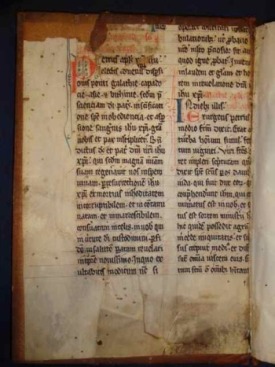"A Faithful Creator" -- 1 Peter 4:12-19
 Tuesday, April 12, 2016 at 10:13AM
Tuesday, April 12, 2016 at 10:13AM  The Tenth in a Series of Sermons on 1 Peter
The Tenth in a Series of Sermons on 1 Peter
Peter’s purpose in writing his first epistle is to comfort persecuted Christians in Asia Minor, many of whom who have been displaced from their homes because of a decree from the Roman emperor Claudius. Peter has reminded them that despite their struggles, in God’s eyes, they are elect exiles, citizens of heaven, and when worshiping together they compose God’s spiritual house (the church)–And this even while they are sojourning upon the earth until the day of final judgment when God will dispense his covenant blessings and curses. Through a lengthy series of imperatives (commands), Peter has told these struggling Christians how they are to differentiate themselves from the Greco-Roman pagans around them–through their profession of faith in the Triune God who sent his Son to die for his people’s sins, and through their honorable conduct before the Pagans. Christians are to think and live as God’s people–they must live a life of self control, in contrast to their pagan neighbors who live to indulge every urge of the sinful flesh. But even if Christians do all of the things Peter exhorts them to do, they should not be surprised if their struggles continue and the persecution they face remains intense. As Peter has stated in verse 4 of chapter 4, the pagans “are surprised when you do not join them in the same flood of debauchery, and they malign you.” Evil-doers want nothing more than for professing Christians to join them in their self-indulgence. Having made this point in the first part of the chapter Peter now describes their troubles as a fiery trial, and a time of judgment. Yet, this is also a time in which God’s purposes will be realized, and through which these struggling Christians will grow in their faith.
We return this morning to our series on 1 Peter. As we conclude our time in chapter 4, Peter acknowledges that his readers and hearers have been through very difficult times, so much so, in verse 12, Peter writes, “beloved, do not be surprised at the fiery trial when it comes upon you to test you, as though something strange were happening to you.” Some commentators take Peter’s statement as a warning of an impending calamity, and that extending this warning is the reason why Peter sends this letter to Christians of the Diaspora in Asia Minor. In other words for those hearing/reading Peter’s letter, things have been bad, but they are about to get a whole lot worse. Peter is writing to warn them in advance so that his readers and hearers can prepare themselves for what is about to come.
But most commentators take the view–I think correctly–that verse 12 of chapter 4 begins a new section of the letter in which Peter is not warning of an impending trial, but is instead making the point that Christians must realize that professing faith in Christ, as they have been doing in the midst of a pagan culture, is itself a fiery trial. In fact, Peter made this point clear back in chapter 1 vv. 6-8 when he wrote, “for a little while, if necessary, you have been grieved by various trials, so that the tested genuineness of your faith—more precious than gold that perishes though it is tested by fire—may be found to result in praise and glory and honor at the revelation of Jesus Christ. Though you have not seen him, you love him. Though you do not now see him, you believe in him and rejoice with joy that is inexpressible and filled with glory.” The Christians to whom Peter is writing are being put to the test. They are undergoing a fiery trial–yet a trial with an important purpose. The time of trial is difficult in itself, yet it is that much worse if there is no seeming purpose to it. Peter’s point then is to remind the Christians of Asia Minor that the fiery trial they are currently experiencing has a purpose, and that keeping this in mind will help them endure their trying circumstances.
To read the rest of this sermon, click here


Reader Comments